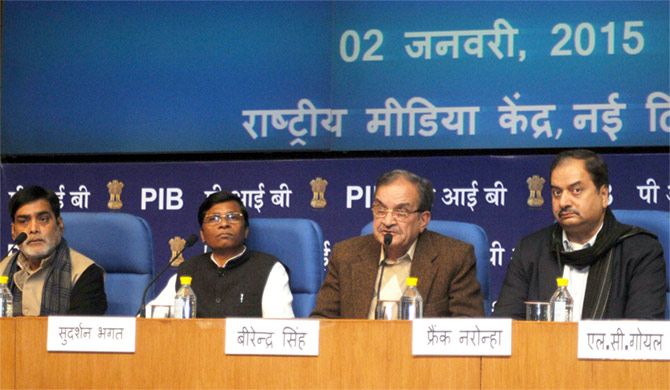'If I am angry, then I do not have the right to be in the Cabinet. Whatever I have done, I have ensured that farmers' interests are protected,' Rural Development Minister Chaudhary Birender Singh, who 'abstained' from a meeting with the President on the ordinance, tells Rashme Sehgal, for Rediff.com
 Union Minister of Rural Development Chaudhary Birender Singh was not present when three Union ministers met President Pranab Mukherjee in December to explain the need for bringing an ordinance on the controversial Land Acquisition Act.
Union Minister of Rural Development Chaudhary Birender Singh was not present when three Union ministers met President Pranab Mukherjee in December to explain the need for bringing an ordinance on the controversial Land Acquisition Act.
The minister's absence was mystifying and there were media reports that Singh -- who hails from farmer-dominated Haryana and defected to the Bharatiya Janata Party from the Congress ahead of the state assembly election last year -- was upset over the dilution of the land acquisition law.
Singh denies this vehemently. "If I am angry, then I do not have (the right) to be in the Cabinet. Whatever I have done, I have ensured that the farmers' interests are protected."
Asked why he was not present when the President sought an explanation for the ordinance, Singh comes up with an ingenuous reply. "Efforts were made to trace me," he says, "but I could not be contacted. If the President wanted to consult one or two ministers, naturally they would be there."
The ordinance has seen farmer organisations across several states come together to take up cudgels against a law which, they believe, will open doors once again to forcible acquisition of land and also allow for easy acquisition of multi-crop land.
Singh denies industry pressure on him to bring amendments in the land law, saying, "I may not be the favourite of industry people. So nobody came to me."
The farmers in Haryana and Punjab are critical of the ordinance, leaving Singh in a tricky situation. A prominent Jat leader, he is the grandson of the legendary Sir Chottu Ram who worked tirelessly during the early part of the 20th century to improve the lot of farmers in north India and remains the biggest leader of the Jat community to date.
Chaudhary Birender Singh, a veteran Congressman of four decades, severed his relationship with his party and switched over to the BJP five months ago because he did not approve of then Haryana chief minister Bhupinder Singh Hooda's functioning.
With political parties led by the Congress coming out strongly against the bill, Singh is being forced to defend what one of his supporters in Jind has described as an "indefensible act."
 Singh knows he has to do some tight rope walking in the coming weeks especially since he cannot afford to alienate his vote bank. The minister is presently involved in holding lengthy interactions with several farmers bodies from his state.
Singh knows he has to do some tight rope walking in the coming weeks especially since he cannot afford to alienate his vote bank. The minister is presently involved in holding lengthy interactions with several farmers bodies from his state.
"A meeting of state (revenue) ministers was held in June last year," he says. "Ministers from several states including Congress-ruled states like Kerala, Karnataka and Assam had suggested a watering down of the such provisions as mandatory consent for at least 70 per cent of locals for acquiring land for PPP projects and 80 per cent for private projects."
"They wanted changes in clauses related to the consent and social impact assessment process as they were finding it very difficult to acquire land for infrastructure and other development projects on the ground," adds the minister.
"All these ministers demanded changes in the Act (prepared under the leadership of then minister Jairam Ramesh) as they were finding it difficult to implement," he says.
What the minister did not say was that the ministers of Kerala, Maharashtra and Manipur had wanted the social impact assessment to be restricted to larger projects.
Strongly defending the ordinance, Singh asserts that farmers' interests have been protected as "none of the clauses relating to compensation, relief and rehabilitation have been removed."
"We have protected the farmers interest to the best of our ability. No compensation clause was touched, no rehabilitation clause was touched. No resettlement clause was touched."
"The objective has been to do away with certain provisions of the Land Acquistion Act such as the required social impact assessment and the taking of consent of 80 per cent of the farmers which would have restricted industrial growth. These have been done away with," Singh points out.
"Land acquisition cannot be stopped for all times to come," the minister believes. "This is not possible."
The decision to adopt the ordinance route is understood to have been taken because under Section 108 of the Land Acquistion Act, clarity was needed to bring the rehabilitation and resettlement and compensation provisions of 13 pieces of legislation at par with those in the new Land Acquisition Act.
The Right to Fair Compensation and Transparency in Rehabilitation and Resettlement Act, 2013, which came into force on January 1, 2014, had specifically said that the 13 existing central pieces of legislation including the Coal Bearing Areas Acquisition and Development Act, 1957, the National Highways Act, 1956, and the Land Acquisition (Mines) Act, 1885 had to be amended within a year to bring them on par with provisions of the new legislation.
Singh highlights that that the Land Acquistion Act would also enhance the compensation and Rehabilitation requirements of these 13 parallel land laws.
Listing them out, he says, "These include the Atomic Energy Act, 1962; the Indian Tramways Act, 1886; the Railways Act, 1989; the Ancient Monuments and Archaeological Sites and Remains Act, 1958; the Petroleum and Minerals Pipelines (Acquisition of Right of User in Land) Act, 1962 and the Damodar Valley Corporation Act, 1948. The Electricity Act, 2003; Requisitioning and Acquisition of Immovable Property Act, 1952; the Resettlement of Displaced Persons (Land Acquisition) Act, 1948 and the Metro Railways (Construction of Works) Act, 1978."
Claiming that the Act passed by the Manmohan Singh government had 60 mistakes and needed to be corrected, Singh, who is the Union minister for rural development, panchayati raj and drinking water and sanitation, claims that Dr Singh's government passed it in a hurry to "please" Congress Vice-President Rahul Gandhi.
A Rajiv Gandhi loyalist, several loyalists to the minister believe he remained in the Congress only out of a sense of loyalty to Sonia Gandhi. But he went public in his displeasure when he said, 'They committed so many mistakes to please Rahulji. Now we are suffering.'
The minister is convinced that the ordinance was necessary to send out a message to investors that procedural bottlenecks are being smoothened in order to give a boost to the manufacturing sector.
In this age of competitive federalism, Singh believes the new land law will propel the growth of rural India by enhancing the value of land and also increasing employment.
Also Read:
- Exclusive! Medha Patkar: Land acquisition ordinance will destroy poor
- Forest land: As India Inc cheers, rude shock awaits the tribals
Top Image: A farmer with his oxen on a paddy field at Kakkoor village in Kerala. Photograph: Sivaram V/Reuters
Bottom Image: Chaudhary Birender Singh, second from right. Photograph: Press Information Bureau











 © 2025
© 2025